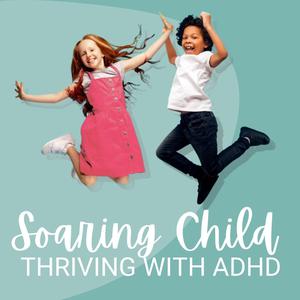
Soaring Child: Thriving with ADHD
Dana Kay
- 32 minutes 32 seconds143: Breathwork and Mindfulness for Kids with ADHD with Beata Heymann
Join Dana Kay as she welcomes Beata Heymann, founder of Breath Circle and an experienced trauma-informed yoga teacher and trainer, to the Soaring Child podcast. Beata specializes in helping at-risk youth and individuals with ADHD by introducing them to powerful self-regulation tools like breathwork, yoga, and mindfulness.
In this episode, they dive into how these practices can foster calm, focus, and emotional resilience in children and young adults. Beata shares her journey into trauma-informed practices, the transformative impact they have had in schools, and simple techniques parents can use at home to support their kids.
If you’re looking for accessible, practical strategies to help your child find calm amidst the chaos, this episode is for you!
Links Mentioned in the Show:
- Free Breakfast Guide - http://adhdthriveinstitute.com/breakfastguide
Key Takeaways:
[3:18] The Role of Trauma-Informed Practices in ADHD Support [5:56] The Importance of Early Intervention for Emotional Regulation [6:54] Structuring Breathwork and Yoga Sessions for Kids [9:15] Demonstrating Mindfulness Practices [14:09] Observed Changes in Students’ Emotional Regulation and Focus [18:44] Strategies for Integrating Breathwork into Daily Life [23:31] Simple Practices for Parents and Kids at Home
Memorable Moments: "Breathwork is the deepest, most potent, and powerful practice for self-regulation." "We breathe every day, but mindful breathing teaches us how to shift our state consciously." "If we can teach our children mindfulness and meditation at a young age, it will carry through to adulthood." "Repetition and consistency are critical for kids with ADHD to feel grounded and safe." "When you lead kids back home to themselves, they discover a new sense of calm and focus." "Breathwork is a free tool that doesn’t require expense or much effort—it’s accessible to everyone." "By sitting with your child and taking a few deep breaths, you can create an anchor for calm in their day." "Small steps, like 2 minutes of breathwork, can shift how you and your child feel instantly." "Teaching self-regulation tools empowers kids to face challenges with resilience and confidence."
How to Connect with Beata Heymann
- Website: https://www.breathcircle.org/
Dana Kay Resources:
🔗WEBSITES:
👋SOCIALS:
- Facebook: https://www.facebook.com/ADHDThriveInstitute/
- Instagram: https://www.instagram.com/adhdthriveinstitute/
- YouTube: https://www.youtube.com/c/ADHDThriveInstitute
- LinkedIn: https://www.linkedin.com/company/adhd-thrive-institute/mycompany/
- Pinterest: https://www.pinterest.ph/adhdthriveinstitute/
- Tiktok: https://www.tiktok.com/@adhd_thriveinstitute
📕INTERNATIONAL BEST SELLING BOOK:
- Thriving with ADHD – https://adhdthriveinstitute.com/book/
💻FREE MASTERCLASS
- Free Reduce ADHD Symptoms Naturally Masterclass - https://bit.ly/3GAbFQl
⭐COURSES & PROGRAMS
- ADHD Parenting Course – https://info.adhdthriveinstitute.com/parentingadhd
- ADHD Thrive Method 4 Kids Program – https://adhdthriveinstitute.com/packages/
- Dye-Free for ADHD Course - https://bit.ly/4aFj6TY
23 January 2025, 3:00 am - 15 minutes 38 seconds142: L-Theanine and ADHD with Dana Kay
In this episode of The Soaring Child Podcast, host Dana Kay, a board-certified holistic health and nutrition practitioner, dives into the benefits of L-theanine for children with ADHD. L-theanine, a naturally occurring amino acid found in tea leaves, has been shown to promote calm, improve focus, and enhance sleep—all without causing drowsiness.
In this episode, discover the science behind L-theanine and practical ways to incorporate it into your child’s routine. Don’t forget to grab the downloadable cheat sheet for easy reference!
Links Mentioned in the Show: My Favorite Place to Buy Supplements - http://adhdthriveinstitute.com/supplements My Favorite L-Theanine Supplement - https://shop.adhdthriveinstitute.com/calming-thrive.html L-Theanine Cheat Sheet - https://info.adhdthriveinstitute.com/supplement-for-l-theanine Links to Previous Episodes in this Supplements for ADHD Series: Magnesium - https://adhdthriveinstitute.com/podcast/soaring-child-episode-93/ Saffron - https://adhdthriveinstitute.com/podcast/soaring-child-episode-136/ GABA - https://adhdthriveinstitute.com/podcast/soaring-child-episode-137/
Key Takeaways: [5:17] How L-Theanine Works in the Brain [5:47] ADHD Challenges and the Role of L-Theanine [10:21] The Pros and Cons of L-Theanine Supplementation [12:34] Natural Sources of L-Theanine [13:38] Incorporating L-Theanine Into ADHD Management
Memorable Moments: "Think of L-theanine as a traffic controller for your child’s brain—keeping everything moving smoothly, even during rush hour."
"It’s not just about calm; it’s about calm without the crash."
"L-theanine works by boosting alpha brain wave activity, associated with relaxed alertness."
"This amino acid provides relaxation without sedation—perfect for kids with ADHD."
"Parents want their kids to be themselves, just a calmer version, not a zombie."
"L-theanine can improve focus and concentration by modulating neurotransmitters like dopamine and serotonin."
"This is a tool in your ADHD toolkit, promoting emotional regulation and restful sleep."
"Supplements are just one piece of the ADHD management puzzle—or as I like to say, the pie."
"Whether it’s through green tea or supplements, L-theanine is a game changer for ADHD families."
"Small steps lead to big changes. Start exploring L-theanine today!"
Dana Kay Resources:
🔗WEBSITES:
👋SOCIALS:
- Facebook: https://www.facebook.com/ADHDThriveInstitute/
- Instagram: https://www.instagram.com/adhdthriveinstitute/
- YouTube: https://www.youtube.com/c/ADHDThriveInstitute
- LinkedIn: https://www.linkedin.com/company/adhd-thrive-institute/mycompany/
- Pinterest: https://www.pinterest.ph/adhdthriveinstitute/
- Tiktok: https://www.tiktok.com/@adhd_thriveinstitute
📕INTERNATIONAL BEST SELLING BOOK:
- Thriving with ADHD – https://adhdthriveinstitute.com/book/
💻FREE MASTERCLASS
- Free Reduce ADHD Symptoms Naturally Masterclass - https://bit.ly/3GAbFQl
⭐COURSES & PROGRAMS
- ADHD Parenting Course – https://info.adhdthriveinstitute.com/parentingadhd
- ADHD Thrive Method 4 Kids Program – https://adhdthriveinstitute.com/packages/
- Dye-Free for ADHD Course - https://bit.ly/4aFj6TY
16 January 2025, 3:00 am - 27 minutes 11 seconds141: ADHD & Burnout: The Hidden Battle Parents Face with Dr. Tricia Pingel
In this empowering episode of The Soaring Child Podcast, Dana Kay sits down with Dr. Tricia Pingel, a leading naturopathic physician affectionately known as the "Adrenal Whisperer." Together, they delve into the crucial topic of adrenal fatigue, its impact on parents of children with ADHD, and how chronic stress can leave you feeling "wired but tired." Dr. Pingel sheds light on the internal and external stressors that keep us stuck in survival mode and offers practical strategies to help parents reclaim their energy and well-being.
Whether you’re battling brain fog, exhaustion, or the relentless demands of parenting, this episode is packed with actionable insights, including self-care tips, the importance of gratitude, and easy habits to calm your nervous system and improve adrenal health. Dr. Pingel’s compassionate advice serves as a reminder that you can’t pour from an empty cup—and it’s okay to prioritize yourself. Tune in to gain hope, understanding, and practical tools to create a thriving life for both you and your family.
Links Mentioned in the Show:
- Join Dana Kay’s Free ADHD Parent Support Group: https://www.facebook.com/groups/AdhdAnxietyParentSupport
- Upcoming Free ADHD Masterclass: https://info.adhdthriveinstitute.com/live
Key Takeaways:
[4:09] Understanding Adrenal Dysfunction: The Bear Analogy [7:18] The Difference Between Internal and External Stressors [8:29] The Impact of Chronic Stress on the Body [14:49] Why Stimulants Like Coffee Can Worsen Adrenal Fatigue [18:40] Practical Steps to Calm the Nervous System and Heal Adrenal Health [22:13] The Importance of Self-Love and Gratitude
Memorable Moments:
“Parenting a child with ADHD can feel like running a marathon—with no finish line.” “Your body doesn’t know the difference between the ding of a cell phone and a life-threatening event. It’s all stress.” “We keep creating more bears for ourselves, and eventually, the body says, ‘enough.’” “You can breathe all you want, but if your internal stressors aren’t addressed, healing won’t happen.” “Adrenal fatigue isn’t about being tired all the time—it’s about being stuck in survival mode.” “Every perceived failure is an opportunity for growth.” “When you take care of yourself, you’re modeling for your children how to do the same.” “Our body is an energy factory. When nutrients are depleted, it’s like the assembly line breaks down.” “Gratitude shifts your perspective—it reminds you of the beauty in the everyday.” “You are the key to your family’s success, and self-love is the first step.”
How to Connect with Dr. Tricia Pingel
- Dr. Trisha Pingel’s Website: http://www.drpingel.com
- Follow Dr. Pingel on Instagram: @DrPingel
Dana Kay Resources:
🔗WEBSITES:
👋SOCIALS:
- Facebook: https://www.facebook.com/ADHDThriveInstitute/
- Instagram: https://www.instagram.com/adhdthriveinstitute/
- YouTube: https://www.youtube.com/c/ADHDThriveInstitute
- LinkedIn: https://www.linkedin.com/company/adhd-thrive-institute/mycompany/
- Pinterest: https://www.pinterest.ph/adhdthriveinstitute/
- Tiktok: https://www.tiktok.com/@adhd_thriveinstitute
📕INTERNATIONAL BEST SELLING BOOK:
- Thriving with ADHD – https://adhdthriveinstitute.com/book/
💻FREE MASTERCLASS
- Free Reduce ADHD Symptoms Naturally Masterclass - https://bit.ly/3GAbFQl
⭐COURSES & PROGRAMS
- ADHD Parenting Course – https://info.adhdthriveinstitute.com/parentingadhd
- ADHD Thrive Method 4 Kids Program – https://adhdthriveinstitute.com/packages/
- Dye-Free for ADHD Course - https://bit.ly/4aFj6TY
9 January 2025, 3:00 am - 19 minutes 29 seconds140: 6 Actionable Steps to Reduce ADHD Symptoms Naturally in 2025 with Dana Kay
In this episode of The Soaring Child Podcast, Dana Kay, a board-certified holistic health and nutrition practitioner, shares a realistic, step-by-step plan to help reduce ADHD symptoms naturally in 2025. Drawing from personal experience and years of guiding families, Dana breaks down six actionable steps, from removing inflammatory foods and adding nutrient-rich meals to optimizing detoxification and prioritizing parent support.
Learn practical tips like creating a manageable plan, focusing on sleep and exercise, and using gentle detox methods that fit into your daily routine. Plus, Dana invites you to a free live ADHD masterclass to dive even deeper into these strategies and kickstart a thriving new year. Tune in and take the first step toward transforming your child’s ADHD journey!
Links Mentioned in the Show:
- Upcoming Training - 3 Steps to Reduce ADHD Symptoms Naturally - https://info.adhdthriveinstitute.com/live
- The ADHD Diet, Part 1 - https://adhdthriveinstitute.com/podcast/soaring-child-episode-5/
- The ADHD Diet, Part 2 - https://adhdthriveinstitute.com/podcast/soaring-child-episode-6/
- Sleep Issues in Kids with ADHD with Ashley Gobeil - https://adhdthriveinstitute.com/podcast/soaring-child-episode-117/
- Sleep Techniques for the Whole Family with Kim West - https://adhdthriveinstitute.com/podcast/soaring-child-episode-35/
- Exercise for ADHD with Dana Kay - https://adhdthriveinstitute.com/podcast/soaring-child-episode-97-2/
- Free ADHD Parent Support Group on Facebook - https://www.facebook.com/groups/AdhdAnxietyParentSupport
- ADHD-Specific Parenting Online Course - https://info.adhdthriveinstitute.com/parentingadhd
- The Importance of Detoxification for Kids with ADHD with Dana Kay - https://adhdthriveinstitute.com/podcast/soaring-child-episode-88/
Key Takeaways: [1:40] The Importance of a Realistic Plan [6:22] Step 1: Remove Inflammatory Foods [7:45] Step 2: Add Whole, Nutrient-Rich Foods [10:08] Step 3: Consider Functional Lab Testing [11:36] Step 4: Prioritize Support for Parents [13:20] Step 5: Focus on Sleep and Outdoor Time [13:55] Step 6: Optimize Detoxification [17:54] Free ADHD Masterclass Announcement
Memorable Moments: "Do you want 2025 to be the year your child thrives like never before? It starts with a realistic, actionable plan." "Removing inflammatory foods like gluten, dairy, soy, and artificial additives can be a game-changer for children with ADHD." "A balanced, whole-food diet is essential for supporting brain health and reducing ADHD symptoms." "Functional lab testing often provides the missing puzzle piece when diet alone isn’t enough to address your child’s symptoms." "Parenting a child with ADHD can feel like running a marathon with no finish line—support is your water station." "Sleep and outdoor exercise are two of the most underrated tools for reducing ADHD symptoms naturally." "Reducing your child’s toxic load can optimize detoxification and help improve focus and mood." "Jumping on a trampoline isn’t just fun—it’s one of the best ways to help your child detox naturally." "You don’t have to do it all at once—start with one small change today, and build from there." "Imagine walking into 2025 with a clear plan, confidence, and the tools to set your family up for success."
Dana Kay Resources:🔗WEBSITES:
- https://adhdthriveinstitute.com/
- https://dana-kay.com/
👋SOCIALS:
- Facebook: https://www.facebook.com/ADHDThriveInstitute/
- Instagram: https://www.instagram.com/adhdthriveinstitute/
- YouTube: https://www.youtube.com/c/ADHDThriveInstitute
- LinkedIn: https://www.linkedin.com/company/adhd-thrive-institute/mycompany/
- Pinterest: https://www.pinterest.ph/adhdthriveinstitute/
- Tiktok: https://www.tiktok.com/@adhd_thriveinstitute
📕INTERNATIONAL BEST SELLING BOOK:
- Thriving with ADHD – https://adhdthriveinstitute.com/book/
💻FREE MASTERCLASS
- Free Reduce ADHD Symptoms Naturally Masterclass - https://bit.ly/3GAbFQl
⭐COURSES & PROGRAMS
- ADHD Parenting Course – https://info.adhdthriveinstitute.com/parentingadhd
- ADHD Thrive Method 4 Kids Program – https://adhdthriveinstitute.com/packages/
- Dye-Free for ADHD Course - https://bit.ly/4aFj6TY
2 January 2025, 8:56 am - 32 minutes 2 seconds139: Mold and ADHD (Part 2) - The Best Way to Test for Mold In Your Home with Brian Karr
In this episode of The Soaring Child Podcast, we continue our deep dive into the hidden dangers of mold and its impact on ADHD symptoms with mold expert Brian Karr. Building on the foundation set in Part 1, Brian explains how to identify hidden mold threats in your home and the critical steps to choosing the right mold test. From understanding why ERMI mold testing often falls short to knowing what certifications to look for in a remediation company, this episode is packed with actionable insights for parents seeking to create a healthier environment for their children.
Brian also shares practical advice on how various climates affect mold growth, what to do if mold is found in your home, and tips for protecting your HVAC system from humidity. This conversation is both empowering and encouraging, offering parents the tools they need to tackle mold head-on. If you’re navigating the complex relationship between mold exposure and ADHD, this episode is an essential listen.
Links Mentioned in the Show:
- The Effects of Mold on ADHD Kids with Wendy Bernt (Episode 124) - https://adhdthriveinstitute.com/podcast/soaring-child-episode-124/
- Upcoming Training - 3 Steps to Reduce ADHD Symptoms Naturally - https://info.adhdthriveinstitute.com/live
- Part 1 of this Two-Part Episode on Mold & ADHD - https://adhdthriveinstitute.com/podcast/soaring-child-episode-138/
Key Takeaways: [2:16] What should you do if you suspect mold in your home? [7:03] Why ERMI mold testing does not work [13:11] How various climates affect mold growth [13:36] What to do if a test show mold in your home [13:59] Key things people should look for in a remediation company [26:40] Certifications for remediation companies [28:14] Brian’s key message for parents about mold [30:29] Where to find Brian online
Memorable Moments: ”Dust acts kind of like a spiderweb and holds it [mold]. It keeps it there.” ”In dust analysis you are able to analyze the contents of the dust in a more progressive way.” ”As you breathe, your body has a natural filtering system in it…but these particles are so small they go right through it.” ”Every mold is a water damage mold.” ”While the climate may have some impact, it is not the most significant impact. The most significant impact that we find in the house are moisture issues that happened inside the house at some point in time.” ”Protect your HVAC system from the humidity.” ”Just because we found 15 areas of mold in your house doesn’t mean you have to remediate all 15 areas.” ”I have seen so many people get so much better…It’s not going to happen overnight, but it happens, and it happens a lot.” ”Take it seriously. Don’t be afraid of it. It’s very conquerable. You just have to surround yourself with the right people.”
How to Connect with Brian Karr- Instagram: https://www.instagram.com/moldfinders
- Schedule a free call with my team: yesweinspect.com/call/?wi-attribute=p-scp
🔗WEBSITES:
- https://adhdthriveinstitute.com/
- https://dana-kay.com/
👋SOCIALS:
- Facebook: https://www.facebook.com/ADHDThriveInstitute/
- Instagram: https://www.instagram.com/adhdthriveinstitute/
- YouTube: https://www.youtube.com/c/ADHDThriveInstitute
- LinkedIn: https://www.linkedin.com/company/adhd-thrive-institute/mycompany/
- Pinterest: https://www.pinterest.ph/adhdthriveinstitute/
- Tiktok: https://www.tiktok.com/@adhd_thriveinstitute
📕INTERNATIONAL BEST SELLING BOOK:
- Thriving with ADHD – https://adhdthriveinstitute.com/book/
💻FREE MASTERCLASS
- Free Reduce ADHD Symptoms Naturally Masterclass - https://bit.ly/3GAbFQl
⭐COURSES & PROGRAMS
- ADHD Parenting Course – https://info.adhdthriveinstitute.com/parentingadhd
- ADHD Thrive Method 4 Kids Program – https://adhdthriveinstitute.com/packages/
- Dye-Free for ADHD Course - https://bit.ly/4aFj6TY
19 December 2024, 3:00 am - 33 minutes 30 seconds138: Mold and ADHD (Part 1): Identifying Hidden Threats and Choosing the Right Mold Test with Brian Karr
Most mold in homes is hidden. It’s often lurking behind drywall, under carpets, or in places you’d NEVER think to check. This hidden mold could be making your child’s ADHD symptoms worse without you even realizing it. That’s because mold exposure is a massive stressor on the body. So, how do you find it? And more importantly, how do you get rid of it?
In this episode of the Soaring Child podcast, mold expert Brian Karr breaks it all down. Brian is a second-generation indoor environmental consultant, specializing in assisting hypersensitive individuals with complex medical conditions by identifying and addressing mold, mycotoxins, and other indoor pathogens in their homes, leading to significant improvements in their health.
As the co-founder of We Inspect and The Dust Test, Brian has become a recognized authority on mold and biotoxin issues for medical professionals nationwide, having assisted over 5,000 hypersensitive individuals in creating healthier living environments.
Tune in to discover if mold could be an underlying stressor for your child and what to do about it!
Links Mentioned in the Show:
- The Effects of Mold on ADHD Kids with Wendy Bernt (Episode 124) - https://adhdthriveinstitute.com/podcast/soaring-child-episode-124/
- Upcoming Training - 3 Steps to Reduce ADHD Symptoms Naturally - https://info.adhdthriveinstitute.com/live
[4:52] Why Mold is Often Hidden and Its Health Risks[6:46] Dangers of Relying on Sight and Smell Alone for Mold Detection[8:18] Identifying Signs of Mold Exposure in Your Home[10:20] Testing Strategies to Detect Hidden Mold[18:04] The Impact of Mold on Children's Health and ADHD Symptoms[18:41] Mold and Its Neurological and Gut Health Effects[19:27] Key Symptoms of Mold Exposure in Children and Adults[26:50] Why Mold Affects Some People More Than Others
Memorable Moments:"Something as invisible as mold can have a profound impact on our health, especially for our kids with ADHD."
"Choosing the wrong mold test can leave dangerous mold undetected, affecting your family's health for years."
"Most mold in a house is hidden. If you can see it, there's often a lot more lurking behind walls and ceilings."
"Think of mold like an iceberg: what you see is often just the tip of a much bigger issue."
"If you rely only on sight and smell, you’re missing almost all of the mold that could be affecting your health."
"Carpet creates more dust and particles, adding to consistent exposure, especially for kids with ADHD or allergies."
"If symptoms aren’t resolving, it could be due to environmental factors – often mold that’s gone unnoticed."
"Sudden-onset bedwetting in children has often been linked to mold exposure, especially when other symptoms are present."
"Mold produces mycotoxins – toxins that can create inflammation throughout the body and target brain and gut health."
"Inflammation from mold exposure can impact multiple systems in the body, causing a range of symptoms that are hard to trace."
How to Connect with Brian Karr- Instagram: https://www.instagram.com/moldfinders
- Schedule a free call with my team: yesweinspect.com/call/?wi-attribute=p-scp
🔗WEBSITES:
- https://adhdthriveinstitute.com/
- https://dana-kay.com/
👋SOCIALS:
- Facebook: https://www.facebook.com/ADHDThriveInstitute/
- Instagram: https://www.instagram.com/adhdthriveinstitute/
- YouTube: https://www.youtube.com/c/ADHDThriveInstitute
- LinkedIn: https://www.linkedin.com/company/adhd-thrive-institute/mycompany/
- Pinterest: https://www.pinterest.ph/adhdthriveinstitute/
- Tiktok: https://www.tiktok.com/@adhd_thriveinstitute
📕INTERNATIONAL BEST SELLING BOOK:
- Thriving with ADHD – https://adhdthriveinstitute.com/book/
💻FREE MASTERCLASS
- Free Reduce ADHD Symptoms Naturally Masterclass - https://bit.ly/3GAbFQl
⭐COURSES & PROGRAMS
- ADHD Parenting Course – https://info.adhdthriveinstitute.com/parentingadhd
- ADHD Thrive Method 4 Kids Program – https://adhdthriveinstitute.com/packages/
- Dye-Free for ADHD Course - https://bit.ly/4aFj6TY
12 December 2024, 3:00 am - 17 minutes137: GABA for ADHD with Dana Kay
Have you ever heard of GABA? Or wondered if it might be beneficial for your child with ADHD? If you have, you’re in the right place, because that’s what this episode of the Soaring Child podcast is all about!
Join Dana Kay, board certified holistic health and nutrition practitioner, as she explores the pros and cons of GABA, natural ways to increase GABA in the body, and more!
Link mentioned in the episode: ➡️ My Favorite Place to buy Supplements - http://adhdthriveinstitute.com/supplements ➡️ GABA Cheat Sheet -https://info.adhdthriveinstitute.com/supplement-for-adhd-gaba https://shop.adhdthriveinstitute.com/calming-thrive.html
Links to Previous Episodes in this Supplements for ADHD Series: ➡️ Magnesium - https://adhdthriveinstitute.com/podcast/soaring-child-episode-93/ ➡️ Saffron -https://adhdthriveinstitute.com/podcast/soaring-child-episode-136/
Key Takeaways: [2:04] What is GABA? [5:43] Signs of Low GABA Levels [6:10] Factors Affecting GABA Production [7:16] Pros of GABA for ADHD [8:18] Cons of GABA for ADHD [13:03] Natural Ways to Boost GABA [15:01] My Favorite GABA Supplement
Memorable Moments:
"GABA plays a role in the body’s ability to handle stress and affects focus and concentration."
"For children with ADHD, GABA may help in moderating symptoms by reducing neuronal excitability."
"Low GABA levels can contribute to anxiety, difficulty relaxing, and issues with sleep."
"GABA’s calming properties can help alleviate anxiety, leading to better focus and reduced hyperactivity."
"GABA supplements may not be absorbed as effectively due to the blood-brain barrier, so quality matters."
"Fermented foods and whole grains can naturally increase GABA levels in the body."
"Regular physical activity, mindfulness, and meditation practices can also increase GABA levels naturally."
"Although GABA has potential benefits, it should not be seen as a be-all, end-all solution for ADHD."
"Some children might experience side effects like fatigue or headaches from GABA supplements."
"Always consult with a healthcare provider before starting GABA supplements, especially if your child is on other medications."
Dana Kay Resources:🔗WEBSITES:
- https://adhdthriveinstitute.com/
- https://dana-kay.com/
👋SOCIALS:
- Facebook: https://www.facebook.com/ADHDThriveInstitute/
- Instagram: https://www.instagram.com/adhdthriveinstitute/
- YouTube: https://www.youtube.com/c/ADHDThriveInstitute
- LinkedIn: https://www.linkedin.com/company/adhd-thrive-institute/mycompany/
- Pinterest: https://www.pinterest.ph/adhdthriveinstitute/
- Tiktok: https://www.tiktok.com/@adhd_thriveinstitute
📕INTERNATIONAL BEST SELLING BOOK:
- Thriving with ADHD – https://adhdthriveinstitute.com/book/
💻FREE MASTERCLASS
- Free Reduce ADHD Symptoms Naturally Masterclass - https://bit.ly/3GAbFQl
⭐COURSES & PROGRAMS
- ADHD Parenting Course – https://info.adhdthriveinstitute.com/parentingadhd
- ADHD Thrive Method 4 Kids Program – https://adhdthriveinstitute.com/packages/
- Dye-Free for ADHD Course - https://bit.ly/4aFj6TY
5 December 2024, 3:00 am - 24 minutes 42 seconds136: Saffron for ADHD with Dana Kay
Have you ever wondered if saffron could be a beneficial supplement to help your child with ADHD? Is it worth the investment, or just another over-hyped remedy? Find out in this episode of the Soaring Child podcast.
Discover the pros and cons of saffron for ADHD, as well as where to find high quality saffron supplements, as Dana Kay, board certified holistic health and nutrition practitioner, shares more about this spice.
Links Mentioned in the Show:
- My Favorite Supplement Supplier: http://adhdthriveinstitute.com/supplements
- Saffron Cheat Sheet - https://info.adhdthriveinstitute.com/supplement-for-adhd-saffron
- ProEssentials (my favorite saffron supplement) - https://shop.adhdthriveinstitute.com/pro-essentials.html
Key Takeaways: [3:18] What is Saffron? [4:09] How Saffron Works for ADHD [6:14] Pros of Using Saffron for ADHD [7:59] Cons of Using Saffron for ADHD [9:59] Research on Saffron for ADHD [21:52] My Favorite Saffron Supplement
Memorable Moments: "Saffron may help alleviate symptoms like inattention, restlessness, and mood fluctuations by influencing neurotransmitters in the brain."
"Saffron showed comparable efficacy to methylphenidate, especially in reducing hyperactivity symptoms. My mind was blown!"
"Saffron is generally considered safe when used in food and moderate therapeutic doses. It presents fewer side effects compared to traditional ADHD medications."
"You can’t supplement your way out of a poor diet. But supplementation can support children with ADHD when paired with other natural strategies."
"Saffron’s antioxidant and anti-inflammatory properties may support improved attention and mental clarity."
"A healthy gut equals a healthy brain—saffron supplements that include probiotics can enhance the gut-brain connection."
"High-quality saffron can be expensive, but it’s essential to invest in trusted products to ensure effectiveness and safety."
"While saffron has shown potential for ADHD, it may not be a comprehensive solution without dietary and lifestyle changes."
"Several studies suggest that saffron may be as effective as traditional ADHD medications, without the severe side effects."
"Always consult a healthcare professional before starting any new supplement, including saffron, especially if your child is on other medications."
Dana Kay Resources:🔗WEBSITES:
- https://adhdthriveinstitute.com/
- https://dana-kay.com/
👋SOCIALS:
- Facebook: https://www.facebook.com/ADHDThriveInstitute/
- Instagram: https://www.instagram.com/adhdthriveinstitute/
- YouTube: https://www.youtube.com/c/ADHDThriveInstitute
- LinkedIn: https://www.linkedin.com/company/adhd-thrive-institute/mycompany/
- Pinterest: https://www.pinterest.ph/adhdthriveinstitute/
- Tiktok: https://www.tiktok.com/@adhd_thriveinstitute
📕INTERNATIONAL BEST SELLING BOOK:
- Thriving with ADHD – https://adhdthriveinstitute.com/book/
💻FREE MASTERCLASS
- Free Reduce ADHD Symptoms Naturally Masterclass - https://bit.ly/3GAbFQl
⭐COURSES & PROGRAMS
- ADHD Parenting Course – https://info.adhdthriveinstitute.com/parentingadhd
- ADHD Thrive Method 4 Kids Program – https://adhdthriveinstitute.com/packages/
- Dye-Free for ADHD Course - https://bit.ly/4aFj6TY
28 November 2024, 3:00 am - 38 minutes 45 seconds135: How Excess Sugar Impacts Kids with ADHD with Michael Goran
We all know excess sugar isn't great, but do we really understand just how hidden and dangerous it can actually be, particularly when it comes to our kids' health and behavior? In this episode, discover how excess sugar can impact kids with ADHD.
Joining us today is Michael Goran. Michael is Professor and Vice Chair for Research in the Department of Pediatrics at Children’s Hospital Los Angeles and Program Director for Nutrition and Obesity at The Saban Research Institute.
He is a native of Glasgow, Scotland, and received his Ph.D. from the University of Manchester, UK. His research on infant and childhood nutrition has been continuously funded by the NIH for the past 35 years, raising $80m in funding, and publishing over 400 peer-reviewed articles.
In 2021 he founded the Southern California Center for Latino Health, a regional initiative focused on developing academic-community solutions to chronic disease disparities in Latino families and funded by a $25m grant from the National Institute for Minority Health Disparities. He has received numerous awards including: The Nutrition Society Medal for Research (1996), The Lilly Award for Scientific Achievement from The Obesity Society (2006), the TOPS award for contributions to obesity research from The Obesity Society (2014), and the Rank Prize Lecture in Nutrition (2018). Michael lives in Silverlake, LA and likes to play tennis, cook, eat, hike, walk his dog and travel.
He is the author of “Sugarproof: Protect Your Family from the Hidden Dangers of Excess Sugar with Simple Everyday Fixes.”
Tune in to discover the truth about sugar and some practical solutions.
Links Mentioned in the Show:
- Free Breakfast Recipe Guide - http://adhdthriveinstitute.com/breakfastguide
Key Takeaways: [7:12] How Sugar Consumption Has Changed Over Time [10:15] The Misconception of Fruit Juice as a Healthy Option [10:42] Understanding Sugar’s Effect on the Body and Brain [14:24] Common Health Impacts of Excess Sugar in Children [21:21] The Link Between Sugar and Brain Development [23:28] Practical Tips for Reducing Sugar in Children’s Diets [24:31] Seven-Day No Added Sugar Challenge [37:08] Where to Find More Information
Memorable Moments: "Sugar doesn’t just cause energy spikes; it can completely throw off a child’s mood, focus, and behavior."
"Sugar is hiding in 70% of processed foods – and in 80% of foods marketed to children."
"The more sugar you eat, the more your body craves it – this cycle is designed to keep you coming back for more."
"Most parents don’t realize that apple juice has more fructose than soda made with high fructose corn syrup."
"Our seven-day no added sugar challenge helps reset cravings and boosts focus and energy."
"Excess sugar during brain development can cause long-lasting effects, even if it’s only consumed for a short time."
"Fatty liver disease is now a leading cause of liver disease in children – sugar overload is a huge factor."
"Small swaps make a big difference. Replace one sugary product at a time to reduce sugar intake gradually."
"Becoming ‘sugar-proof’ isn’t about avoidance – it’s about knowing where sugar hides and making healthier choices."
How to Connect with Michael Goran
- Instagram: https://www.instagram.com/sugarproofkids/?hl=en
- Website: https://www.sugarproofkids.com/
🔗WEBSITES:
- https://adhdthriveinstitute.com/
- https://dana-kay.com/
👋SOCIALS:
- Facebook: https://www.facebook.com/ADHDThriveInstitute/
- Instagram: https://www.instagram.com/adhdthriveinstitute/
- YouTube: https://www.youtube.com/c/ADHDThriveInstitute
- LinkedIn: https://www.linkedin.com/company/adhd-thrive-institute/mycompany/
- Pinterest: https://www.pinterest.ph/adhdthriveinstitute/
- Tiktok: https://www.tiktok.com/@adhd_thriveinstitute
📕INTERNATIONAL BEST SELLING BOOK:
- Thriving with ADHD – https://adhdthriveinstitute.com/book/
💻FREE MASTERCLASS
- Free Reduce ADHD Symptoms Naturally Masterclass - https://bit.ly/3GAbFQl
⭐COURSES & PROGRAMS
- ADHD Parenting Course – https://info.adhdthriveinstitute.com/parentingadhd
- ADHD Thrive Method 4 Kids Program – https://adhdthriveinstitute.com/packages/
- Dye-Free for ADHD Course - https://bit.ly/4aFj6TY
21 November 2024, 3:00 am - 25 minutes 7 seconds134: Enjoying the Holidays on a Gluten and Dairy-Free ADHD Diet with Andrea Daigle
Avoiding gluten, dairy, soy, artificial flavors or colors, or other highly inflammatory foods during the holidays can be tricky! But Andrea Daigle has some AMAZING tips in this episode of the Soaring Child podcast.
Andrea is one of our expert coaches at the ADHD Thrive Institute, a board-certified holistic health practitioner, and FDN-P. She’s been an amazing guide to countless families, helping them manage ADHD naturally. She’s also a regular on this podcast, and I know her advice will leave you feeling prepared, supported, and ready to enjoy the holidays without stress.
If you want to enjoy the holidays without a meltdown, preparation is absolutely everything, and this episode will give you lots of tips to help!
Links Mentioned in the Show:
- ADHD Fast Class - https://bit.ly/3GAbFQl
Key Takeaways:
[3:43] Challenges of Holiday Gatherings for Gluten and Dairy-Free Diets [4:09] Tips for Preparing Gluten and Dairy-Free Foods [5:09] Getting the Whole Family Involved [6:54] Key Ingredients for Substitutions and Creative Boards [15:45] A Recap of the Steps Parents Can Take for Holiday Parties [16:14] Staying Positive and Motivated [17:03] Crowd-Pleasing Gluten and Dairy-Free Holiday Dishes [20:02] How to Handle Accidental Gluten and Dairy Exposure
Memorable Moments: "Preparation is the key to avoiding holiday meltdowns for kids with ADHD."
"One holiday, all we found were some gluten-free crackers and a sad little salad – we learned the hard way."
"If kids help shop and cook, they’re more likely to eat and enjoy what’s on their plates."
"Bring a dish to share – a crowd-pleasing gluten-free dessert or charcuterie board can make a big difference."
"When everyone eats better, they feel better. Keep that as a mantra during the holidays."
"Communicate with your host and don’t hesitate to offer to bring gluten-free options."
"Stock up on gluten-free treats and keep them in your freezer for those last-minute holiday parties."
"If your child sneaks a cookie, don’t panic. Accidents happen, and it’s okay."
"Use moments of gluten or dairy slip-ups as teaching moments, focusing on how different foods make them feel."
"A pumpkin pie or stuffing can be made gluten and dairy-free with just a few simple swaps."
How to Connect with Andrea Daigle
Schedule a free call with Andrea and the team at ADHD Thrive Institute: https://bit.ly/3X5ZVvT
Dana Kay Resources:🔗WEBSITES:
- https://adhdthriveinstitute.com/
- https://dana-kay.com/
👋SOCIALS:
- Facebook: https://www.facebook.com/ADHDThriveInstitute/
- Instagram: https://www.instagram.com/adhdthriveinstitute/
- YouTube: https://www.youtube.com/c/ADHDThriveInstitute
- LinkedIn: https://www.linkedin.com/company/adhd-thrive-institute/mycompany/
- Pinterest: https://www.pinterest.ph/adhdthriveinstitute/
- Tiktok: https://www.tiktok.com/@adhd_thriveinstitute
📕INTERNATIONAL BEST SELLING BOOK:
- Thriving with ADHD – https://adhdthriveinstitute.com/book/
💻FREE MASTERCLASS
- Free Reduce ADHD Symptoms Naturally Masterclass - https://bit.ly/3GAbFQl
⭐COURSES & PROGRAMS
- ADHD Parenting Course – https://info.adhdthriveinstitute.com/parentingadhd
- ADHD Thrive Method 4 Kids Program – https://adhdthriveinstitute.com/packages/
- Dye-Free for ADHD Course - https://bit.ly/4aFj6TY
14 November 2024, 3:00 am - 28 minutes 15 seconds133: How Oral Health Affects ADHD with Derek Gatta
In this episode of the Soaring Child podcast, we're diving into a topic that might seem a little bit unexpected, but could completely change how you support your child with ADHD, and that is oral health. Joining us for this episode is Dr. Derek Gatta.
Dr. Gatta is a dentist and co-founder of RiseWell, a science-backed oral care brand that’s revolutionizing the industry with its non-toxic, dentist-formulated products. After realizing that most toothpaste on the market contains toxic ingredients, he teamed up with his sister and brother-in-law to create RiseWell, which uses ingredients like hydroxyapatite, a natural alternative that’s both safe and effective.
As the head of the scientific council at RiseWell, Dr. Gatta leads the search for the healthiest and cleanest ingredients, raising the bar for quality and purity in oral care. He’s not only an expert in the field, but he’s passionate about helping people achieve optimal oral health, which is so vital for overall well-being—especially for kids with ADHD.
If you’ve ever wondered how your child’s toothpaste could be playing a role in their ADHD symptoms, you do NOT want to miss this episode.
Links Mentioned in the Show:
- Get Clean Dental Products HERE - https://get.aspr.app/SHmIx Use code - ADHDTHRIVEINSTITUTE
- Symptom Reduction Tool - http://adhdthriveinstitute.com/tool
Key Takeaways: [6:58] The Impact of Oral Health on ADHD [10:49] Common Toxic Ingredients in Traditional Oral Care Products [13:22] The Fluoride Debate: Risks and Alternatives [17:11] Hydroxyapatite: The Natural Alternative to Fluoride [22:18] Other Natural Oral Care Ingredients [24:15] How to Find a Natural-Minded Dentist
Memorable Moments: "I couldn’t believe that something as basic as toothpaste could be contributing to my son’s ADHD symptoms."
"We discovered the toothpaste my son was using was full of artificial ingredients that triggered hyperactivity."
"Oral health is just as important as diet when it comes to supporting kids with ADHD."
"There’s a strong connection between oral health, gut health, and brain health, especially in children with ADHD."
"Bleeding gums can serve as a gateway for bacteria, potentially leading to inflammation that worsens ADHD symptoms."
"Traditional toothpaste contains toxic ingredients, like sodium lauryl sulfate, which can harm the body’s natural balance."
"Many kids with ADHD swallow toothpaste, making it even more crucial to avoid harmful ingredients."
"There’s growing research showing the potential risks of fluoride on neurodevelopment in children."
"Hydroxyapatite is a safe, natural alternative to fluoride that protects teeth without the health concerns."
"Parents need to ask their dentist about fluoride alternatives and safer oral care options for their children."
How to Connect with Derek Gatta
- Dr. Derek’s Dental Practice - Innovative Dental Aesthetics https://innovativedentalaesthetics.com/
- Innovative Dental Aesthetics Instagram: https://www.instagram.com/innovativedentalaesthetics/
- Dr. Derek’s Instagram: https://www.instagram.com/drderekgatta/
🔗WEBSITES:
- https://adhdthriveinstitute.com/
- https://dana-kay.com/
👋SOCIALS:
- Facebook: https://www.facebook.com/ADHDThriveInstitute/
- Instagram: https://www.instagram.com/adhdthriveinstitute/
- YouTube: https://www.youtube.com/c/ADHDThriveInstitute
- LinkedIn: https://www.linkedin.com/company/adhd-thrive-institute/mycompany/
- Pinterest: https://www.pinterest.ph/adhdthriveinstitute/
- Tiktok: https://www.tiktok.com/@adhd_thriveinstitute
📕INTERNATIONAL BEST SELLING BOOK:
- Thriving with ADHD – https://adhdthriveinstitute.com/book/
💻FREE MASTERCLASS
- Free Reduce ADHD Symptoms Naturally Masterclass - https://bit.ly/3GAbFQl
⭐COURSES & PROGRAMS
- ADHD Parenting Course – https://info.adhdthriveinstitute.com/parentingadhd
- ADHD Thrive Method 4 Kids Program – https://adhdthriveinstitute.com/packages/
- Dye-Free for ADHD Course - https://bit.ly/4aFj6TY
7 November 2024, 3:00 am - More Episodes? Get the App
TILT Parenting: Raising Differently Wired Kids
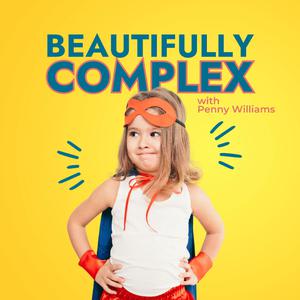 Beautifully Complex
Beautifully Complex
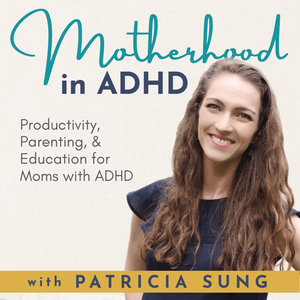 Motherhood in ADHD – Parenting with ADHD, Productivity Tips, Brain based Science, Attention Deficit Hyperactivity Disorder Education to Help Moms with Adult ADHD
Motherhood in ADHD – Parenting with ADHD, Productivity Tips, Brain based Science, Attention Deficit Hyperactivity Disorder Education to Help Moms with Adult ADHD
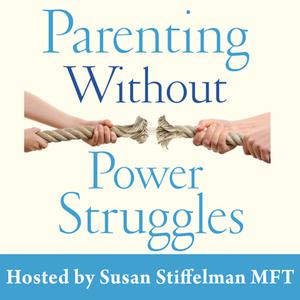 Parenting Without Power Struggles
Parenting Without Power Struggles
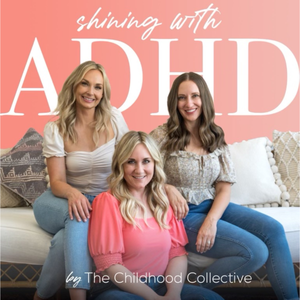 Shining With ADHD by The Childhood Collective
Shining With ADHD by The Childhood Collective
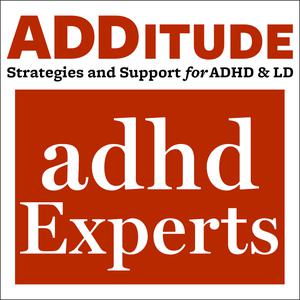 ADHD Experts Podcast
ADHD Experts Podcast
Your feedback is valuable to us. Should you encounter any bugs, glitches, lack of functionality or other problems, please email us on [email protected] or join Moon.FM Telegram Group where you can talk directly to the dev team who are happy to answer any queries.